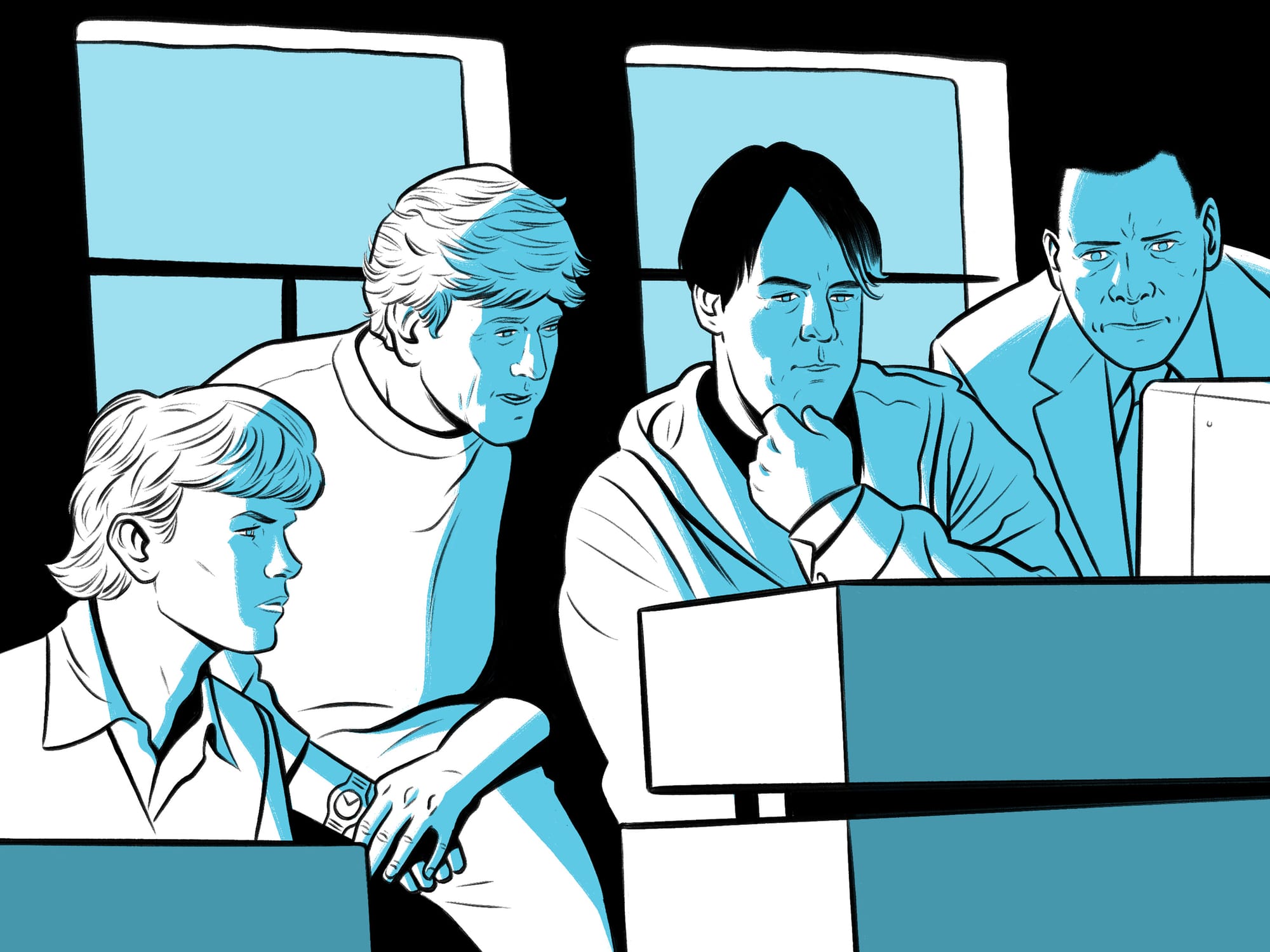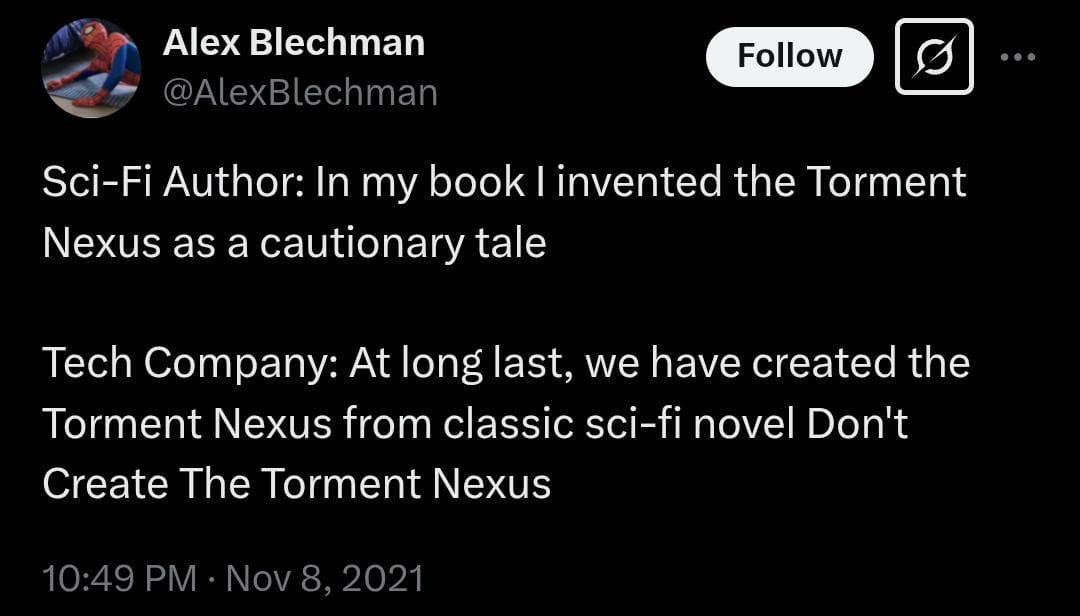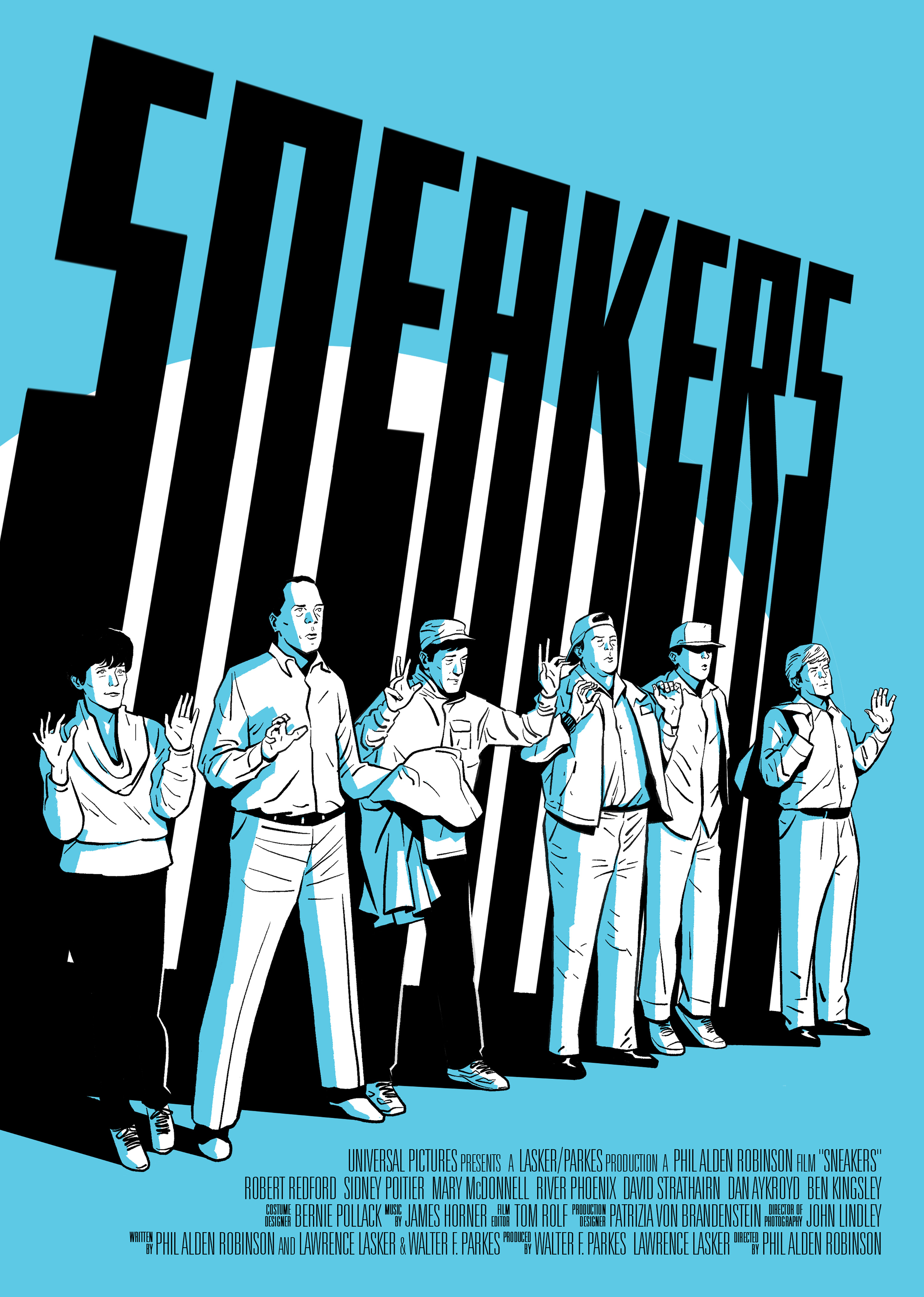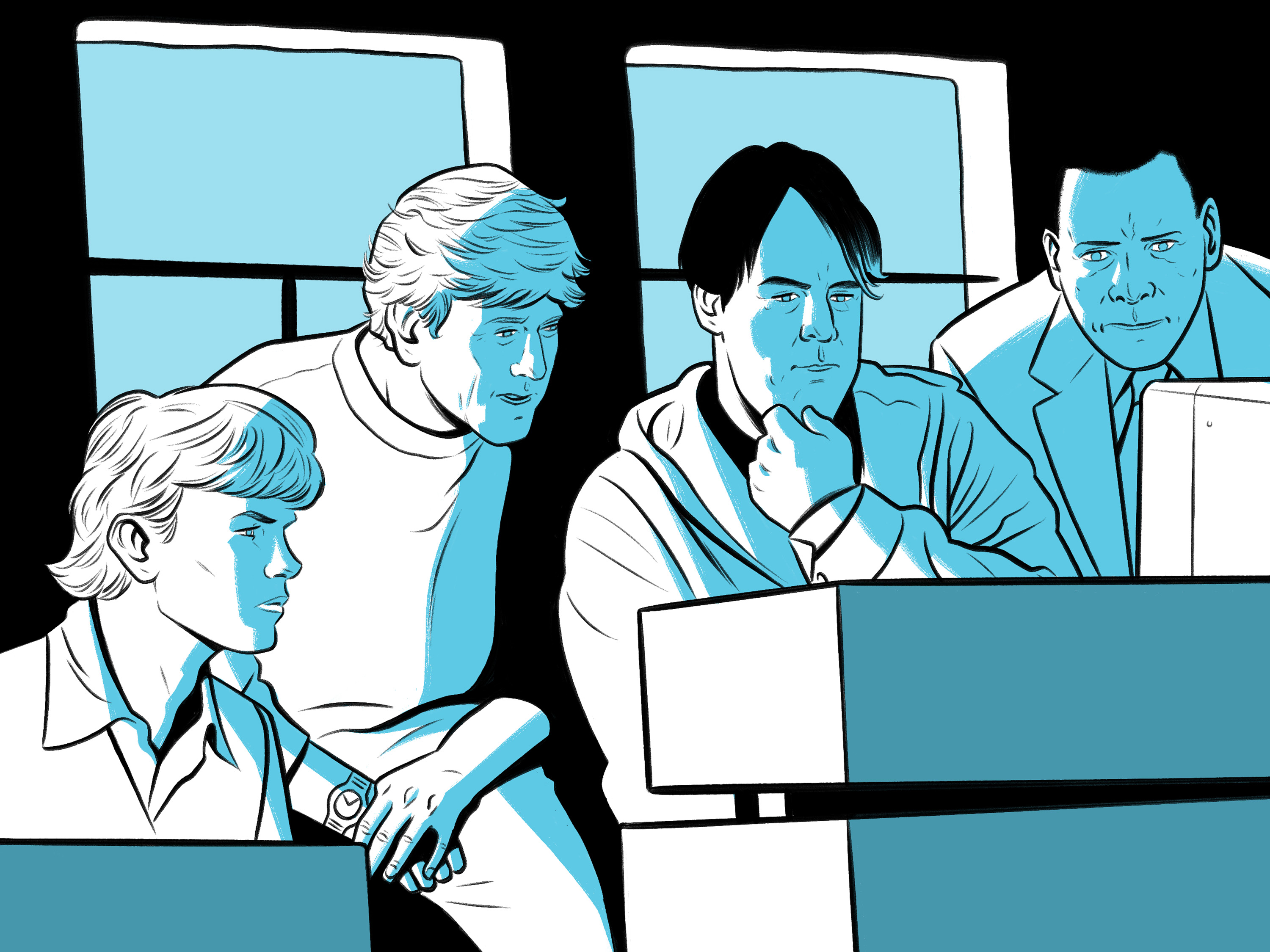No More Secrets
On The Torment Nexus, Surveillance Capitalism, and Sneakers

This is Part 2 of a mini-series on 90s Cyber Thrillers. You can read Part 1 here.
Peter Thiel, the libertarian billionaire and co-founder of PayPal, is one of the Tech Fash Pack currently orbiting the White House. While he didn’t attend Trump’s inauguration (perhaps wisely opting to avoid the additional media scrutiny), he did throw everyone a party afterwards. The Vice President, JD Vance (currently enjoying antagonising world leaders in the Oval Office), worked for one of Thiel’s companies in 2015 and Thiel donated a record-breaking $15 million to Vance’s Senate run.
In JRR Tolkien’s Lord of the Rings, there are these indestructible crystal balls called Palantírs. If someone was to look into one, they would be shown visions from across space, and even time. Images of events that happened in the past, or were happening right now, on the other side of Middle-Earth. If another person was looking into their own Palantír at the same time, you might even get a vision of that person’s innermost thoughts and desires. While Palantírs could never show entirely false images, those with the requisite strength of will could instruct them to present a specific order of true images to another unsuspecting viewer. All with the intent to create a deceptive and misleading narrative. “Alternative facts” if you will.
Originally created as a form of instantaneous communication across Middle-Earth, these “seeing stones” were instead capable of creating mass disinformation and, crucially, lead to decisive tactical missteps across the books. Tolkien disliked allegory and bristled at anyone drawing parallels between his work and the real world, but it’s hard not to see Palantírs as anything other than an allegory for war propaganda and the misguiding intelligence found during the Fog of War. Indeed, these two paragraphs explaining them could easily describe the entirety of John le Carré’s Smiley novels if not all Cold War era spy thrillers.
What Tolkien understood was that to the rich and powerful, information was more valuable than gold and was as deceptive, seductive, and corrupting as the precious metal.
Anyway, when Peter Thiel started a data-sifting and surveillance company in 2003, he named it Palantir.


“Anybody want to shut down the Federal Reserve?” - Whistler
Phil Alden Robinson’s 1992 heist classic Sneakers was a bridging movie in a lot of ways. It was one of the first films that addressed the post-Cold War era status quo, while embodying the paranoid conspiracy potboilers of the 70s and 80s. And it was a light-on-its-feet heist caper. But it was also a film that signalled the beginning of The Information Age. An early entry in the technocautious cyber thrillers of the 90s. It is at once a nostalgic throwback, and a prescient trendsetter. Perhaps this is partly a result of the films’ long gestation. Writers Lawrence Lasker and Walter F. Parkes first conceived of Sneakers while they were researching 1983’s Wargames. They, along with Robinson, worked on 30+ versions of the screenplay over 9 years before it crossed the desk of Robert Redford.
Redford, in the lead role of Martin “Marty” Bishop, is perfect casting. Reconciling his easy charm and heist bona fides (The Sting, The Hot Rock) with the sweaty “this goes all the way to the top!” paranoia of All the President’s Men and Three Days of the Condor.
Marty and his team of hackers (or sneakers) are hired to break into government facilities, banks, and other high value environments in order to find flaws in their security systems. Marty is essentially a former new left radical baby boomer, turned legit. Gone are the revolutionary politics - replaced by a jaded pragmatism. He now works for the people and systems he once railed against.
“So, people hire you to break into their places... to make sure no one can break into their places?” - Bank clerk
“It's a living.” - Marty
“Not a very good one.” - Bank clerk
When their latest sneak turns out to be a universal code breaker that renders every security system in the world obsolete, our sneakers find themselves at the centre of a conspiracy, incapable of knowing who they can trust. Marty comes to realise the mysterious antagonist (SPOILERS) is his former friend and fellow activist, Cosmo (Ben Kingsley). The true believer who recognises that the Information Age is around the corner:
“There's a war out there, old friend. A world war. And it's not about who's got the most bullets. It's about who controls the information. What we see and hear, how we work, what we think... it's all about the information!” - Cosmo

Who does control the information in 2025? Certainly not us.
It’s almost a cliche at this point to say that we, as users of modern technology, are now the product. We can no longer pretend we’re users or even (*retch*) consumers. We are sites of raw metadata just waiting to be mined and exploited. We make jokes about how our phones and devices are listening to us. When a duvet is advertised to us after having a conversation with a friend about duvets, we roll our eyes and grudgingly congratulate the algorithm for it’s accuracy.
“Why does every website feel different, and why do some crash randomly or make your phone burn your hand? It’s because every publisher has pumped their sites full of as much ad tracking software as possible as a means of monetizing every single user in as many ways as possible, helping ads follow you across the entire internet. And why does everybody need your email? Because your inbox is one of the few places that advertisers haven’t found a consistent way to penetrate.” - Ed Zitron (Never Forgive Them)
We were never warned when we started using these platforms that we were making this faustian bargain, but by the time that we realised, it was too late. These things that were built using casino technology to create psychological dependencies had done their job.
“Social media messages can activate the same brain mechanisms as cocaine […] There are whole departments trying to design their systems to be as addictive as possible. They want you to be permanently online and by bombarding you with messages and stimuli try to redirect your attention back to their app or webpage.” - Professor Daniel Kruger
Our minds have been hijacked and we’ve all, largely, accepted it. While we pull the slot machine levers and doomscroll, the Broligarchs (Zuckerberg, Thiel, Andreessen, Bezos, Musk, et al.) collect and hoard the information we give them. Maybe they’ll sell it on to advertisers, maybe they’ll use it to train AI, maybe they’ll use it to manipulate or misinform us in more nefarious ways. Maybe all of the above. Welcome to life under Surveillance Capitalism.
“At its core, surveillance capitalism is parasitic and self-referential. It revives Karl Marx’s old image of capitalism as a vampire that feeds on labour, but with an unexpected turn. Instead of labour, surveillance capitalism feeds on every aspect of every human’s experience.” - Shoshana Zuboff (The Age of Surveillance Capitalism)
In 2009, Richard Thaler and Cass Sunstein introduced the world to Nudge Theory. They suggested people could be ‘nudged’ away from making irrational decisions that would harm them (smoking, drinking, gambling, eating junk) by exploiting information about human psychology, behavioural science, and restructuring what they called the ‘choice architecture’ of society in subtle ways. British Prime Minister David Cameron was so impressed by their book on the subject that in 2010 he introduced a ‘Nudge Unit’ to the UK in 2010 known as the Behavioural Insights Team. While the science and effectiveness of nudge theory continues to be debated, the department was partially privatised in 2013 and Nudge Units are now used by Governments all over the world.
Forms of nudging, known as ‘Dark Patterns’ are used across the internet all the time and there has been a growing movement to name and catalogue them. If you’ve used a computer, you’ll recognise each and every one of these. But this is just a drop in the ocean in terms of the dark arts of persuasion being used against us in the Information Age.
In 2018, it was revealed that Cambridge Analytica had acquired the personal data of 87 million Facebook users and had boasted of having 5 million data points on each user. They took credit for influencing the Brexit vote here in the UK and for assisting Trump’s victory in 2016.
“Instead of standing in the public square and saying what you think, you are whispering into the ear of each and every voter.” - Christopher Wylie (Former Cambridge Analytica employee)
Cambridge Analytica wasn’t the only company caught in this scandal. There was also AggregateIQ, Strategic Communication Laboratories (SCL), Global Science Research and Facebook themselves. SCL (of which Cambridge Analytica was a subsidiary), in fact, described themselves as a “global election management agency”. Very much hiding in plain sight there. While some of these companies have since been shuttered, and key figures let go, I don’t think any of us truly believe that this practice of ‘Dark Nudging’ has stopped in any meaningful way.
And yet I continue to give my data to the internet for free. I log the films I watch on Letterboxd, and the books I read on Storify, I let Duolingo track the way I learn, I let Spotify track my listening habits and then uncritically share their AI infused insights at the end of every year. I ask Strava to track my runs and let Apple log my daily steps and bpms. But perhaps worst of all, I upload my latest art or writing to Instagram or Substack knowing that most of the internet is being scraped to train Large Language Models. These models are being developed by tech companies to make me obsolete. Sure, I’ve ticked all the boxes to say “don’t scrape me please” but do I truly believe they aren’t? Do I think my government has any interest at all in regulating this or protecting me?
All of this data is then funnelled into keeping our attention, isolating us, and bombarding us with so much information and, indeed, misinformation that we can no longer tell the difference between the two. Is this news item real or an AI hallucinating? Or a deepfake? Or a quote from a disingenuous politician who hasn’t been fact-checked? Spending time on the internet requires a level of sophisticated media literacy that most people simply haven’t been equipped with. Media Studies courses were, unfairly, viewed as something of a joke in the late 90s. I think it might be the most vital subject that schools can teach right now.
“We find ourselves today connected to vast repositories of knowledge, and yet we have not learned to think. In fact, the opposite is true: that which was intended to enlighten the world in practice darkens it. The abundance of information and the plurality of worldviews now accessible to us through the internet are not producing a coherent consensus reality, but one driven by fundamentalist insistence on simplistic narratives, conspiracy theories, and post-factual politics. It is on this contradiction that the idea of a new dark age turns: an age in which the value we have placed upon knowledge is destroyed by the abundance of that profitable commodity, and in which we look about ourselves in search of new ways to understand the world.” - James Bridle (New Dark Age)
This deluge of reality-bending Content is supercharged by algorithms that dictate our feeds and serve us whatever slop that platform’s owner wants us to slurp up. Today you’re getting a toxic taste of the Misogyny Slop Ecosystem. Tomorrow a firehose of AI-generated videos are getting sprayed all over your desktop.
Who controls the information? They do.
Musk controls Twitter and, despite his claims to the contrary, aggressively polices what people on there can and can’t see. His teenage DOGE brownshirts have access to America’s most senstive information and are installing their own servers in the halls of government. Bezos owns The Washington Post and is becoming increasingly hands-on in deciding what it prints. Thiel owns Palantir and sells the data collected there to the CIA, FBI and NSA. Zuckerberg controls Meta and is removing any fact-checking or quality control that his platforms once gestured at, however weakly. Simply put, the information is already controlled by a handful of billionaires who have no real ideology other than line go up. If there ever was an information war, we lost.

“I want peace on earth and goodwill toward men.” - Whistler
“We are the United States Government! We don't do that sort of thing.” - Abbott
Sneakers may not have predicted the full extent of the horrors of living in the modern Information Age, but it still feels remarkably prescient for a film made in the early 90s. It highlights the different ways the Reagan era calcified the souls of those who lived through it (much like Grosse Point Blank). Each of our sneakers are conflicted/broken/cynical versions of what they once were or could have been.
I’m still not entirely sure I disagree with the aims of the film’s antagonist: Cosmo. His stated plan is to use the universal code breaking device to destroy the concept of wealth:
“I might even be able to crash the whole damn system. Destroy all records of ownership. Think of it, Marty: no more rich people, no more poor people, everybody's the same. Isn't that what we said we always wanted?” - Cosmo
His reasoning is hard to argue with:
“What's wrong with this country, Marty? Money. You taught me that. Evil defence contractors had it, noble causes did not. Politicians are bought and sold like so much chattel. Our problems multiply. Pollution, crime, drugs, poverty, disease, hunger, despair; we throw gobs of money at them! The problems always get worse. Why is that? Because money's most powerful ability is to allow bad people to continue doing bad things at the expense of those who don't have it.” - Cosmo
If I wasn’t 43 years old, I might describe Cosmo as based.
And yet, we aren’t given his next steps. Would he destroy the device afterwards? Or hold onto it and the power it afforded him? What system replaces the one he crashes? Who gets to decide that? Cosmo? Is he a new left radical finally sticking it to The Man? Or just another tech bro libertarian who wants to Move Fast and Break Things?
I’m not sure Sneakers knows the answers, nor does it, I think, want us to really ask these questions. For all of its prescience and smarts, Sneakers is a fun heist caper that barrels along with charisma and wit. It has a great (hot) ensemble cast (Redford! McDonnell! Poitier! Strathairn! Phoenix! Busfield! Kingsley! Tobolowsky! Earl Jones! …Aykroyd) and everyone gets their moment to shine. There’s a short scene when the team party after a successful operation and everyone takes a moment to dance with Mary McDonnell’s Liz. It’s a charming interlude that tells you more about each character (and how they relate to Liz) in a 30 second dialogue-free montage than some films manage in their entire runtimes.
It’s such a disciplined screenplay too. Born out of those 30+ versions. There are three heists (or sneaks) in the film - neatly mapping onto a three act structure - and in which each heist naturally creates the need for the next one. It reminds me of the cascading heists of The Hot Rock in which Redford’s weary Dortmunder must keep executing a new heist to fix the mistakes of the last one. A good heist is like a warm, cosy blanket to me. At their best they’re just pure, undiluted competency porn. People who are good at their jobs, executing a plan well. Is there a category for that on OnlyFans?
Sneakers received solid, if unremarkable reviews on its release. It did fine but didn’t set the box office alight. Today, barely anyone I know has seen it. That said, it’s been developing something of a reputation as a forgotten cult classic in recent years. Slate ran a whole series of pieces celebrating the 20th anniversary of the film in 2012. If you’ve not had the pleasure, or if you haven’t seen it for a few years, I recommend giving it a re/watch.
Palantir Technologies were awarded a £330 million contract with the NHS in 2023 to develop a centralised data platform. Our current Health Secretary, Wes Streeting, has been pushing for more AI and tech company involvement in our health services in the name of efficiency. I’m worried that all my Apple Health data will one day be used by an insurance company to deny me medical services in a completely privatised NHS that’s been sold, piece by piece, to a libertarian Lord of the Rings nerd who now has one of his own in the Oval Office.
In the late 60s/early 70s, Tolkien had started writing a sequel to Lord of the Rings called The New Shadow. It was set 100 years later, in the time of Men, with the war of the ring barely within living memory. It would have involved teenagers cosplaying as Orcs and people in secretive cults who worshipped Sauron. As we know, the man never met an allegory that he didn’t despise, but this was the time of Enoch Powell and the rise of The National Front in the UK. Was his writing, however unconsciously, a reflection of that?
Tolkien ultimately abandoned the book for being too “sinister and depressing.”
Right there with you buddy.
Do You Want to Know More?
- One of the aforementioned Slate 20th anniversary pieces has Succession composer Nicholas Britell discussing his love of the soundtrack. It’s a brilliant soundtrack.
- Another has some fond shooting recollections of Stephen Tobolowsky.
- As with The Net, another fun promotional press kit!
- An interesting Making Of documentary is available on YouTube.
- The Unclear and Present Danger podcast - in which Jamelle Bouie and John Ganz explore the intersection of 90s action films and 90s politics - have a Sneakers episode where they try to unpack Marty and Cosmo’s divergent new left radical paths.
- Cracking the Code: Sneakers at 30 on Letterboxd.
- A great piece on Bright Wall/Dark Room by Carrie Courogen about Sneakers and letting go of youth/getting older (and how hot Robert Redford is).
Bits + Bytes
- If you enjoy film criticism with a healthy dash of politics, I highly recommend Xaunlin Tham’s Revolutionary Desires - about the political power of the sex scene. A welcome pushback against the growing, oddly puritanical sentiment that sex on screen is gratuitous and unnecessary.
- Relatedly, do you want to be more politically active while also watching great films? Take One Action do brilliant work and might be the sort of thing you’re looking for. If you like the look of the work they do, they’ve got a crowdfunder open at the moment.
